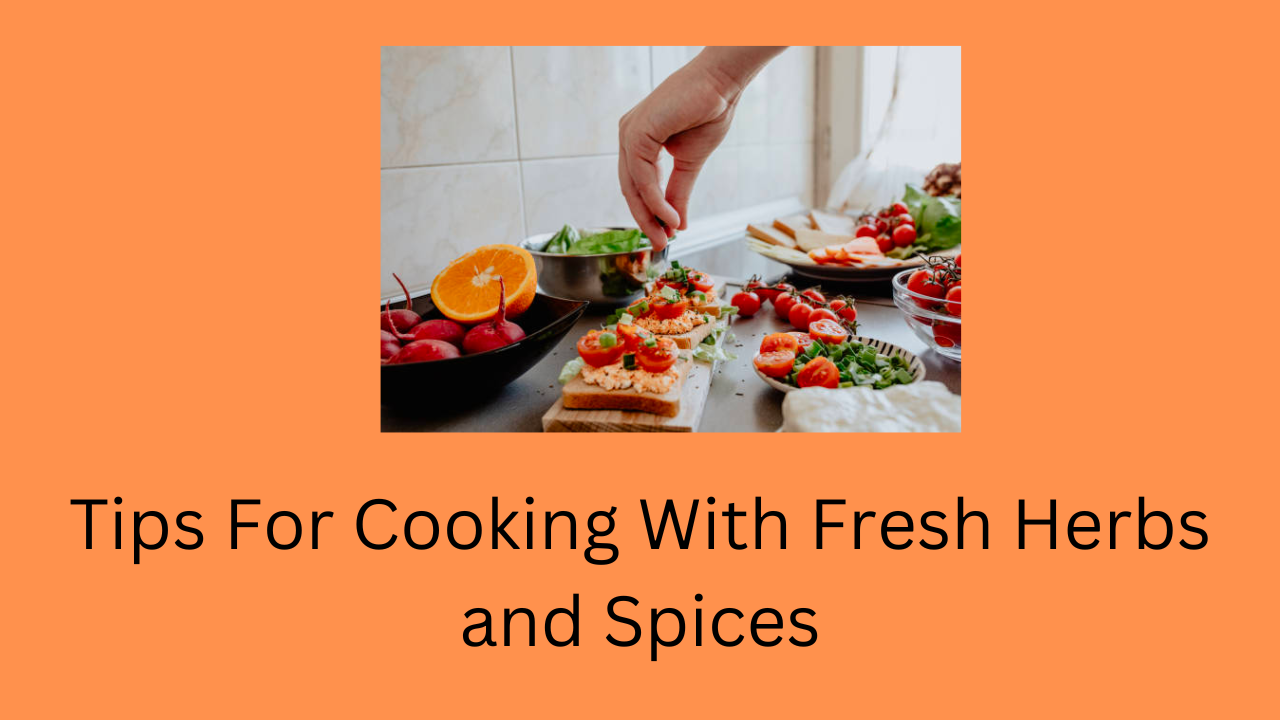Fresh herbs and spices are a great way to add flavor and depth to your dishes. They can also be used to boost the nutritional value of your meals. But with so many different herbs and spices to choose from, it can be difficult to know where to start.
That’s where this blog post comes in. Here, we’ll share some tips for cooking with fresh herbs and spices, so you can start using them to create delicious and flavorful dishes.
What Are some Herbs to Use in Cooking?
Some common herbs to use in cooking include:
- Basil
- Chives
- Cilantro
- Dill
- Mint
- Oregano
- Parsley
- Rosemary
- Sage
- Thyme
Tips For Cooking With Fresh Herbs and Spices
Here are some tips to help you get the most out of fresh herbs and spices:
1. Choose the right herbs and spices for your dish.
The first step to cooking with fresh herbs and spices is to choose the right ones for your dish. There are a few things to keep in mind when making this decision:
- The flavor profile of the dish. What flavors are you trying to achieve? Do you want something savory, sweet, or spicy?
- The cooking method. Some herbs and spices are better suited for certain cooking methods than others. For example, delicate herbs like parsley and chives should be added at the end of cooking, while heartier herbs like rosemary and thyme can be cooked for longer periods of time.
- Your personal preferences. Experiment with different herbs and spices until you find a combination that you like.
2. Store your herbs and spices properly.
To ensure that your herbs and spices stay fresh and flavorful, it’s important to store them properly. Here are a few tips:
- Store fresh herbs in the refrigerator. Wrap them in damp paper towels and place them in a plastic bag.
- Store dried herbs in a cool, dark place. A cupboard or pantry is a good option.
- Store spices in an airtight container. This will help to keep them fresh and prevent them from losing their flavor.
3. Wash and chop your herbs.
Before you add herbs to your dish, it’s important to wash and chop them. This will help to remove any dirt or bacteria, and it will also make them easier to incorporate into your dish.
To wash herbs, simply rinse them under cold water. Then, pat them dry with a paper towel. To chop herbs, you can use a knife or a pair of kitchen shears.
4. Add herbs at the right time.
The timing of when you add herbs to your dish is important. Some herbs, like parsley and chives, should be added at the end of cooking, while others, like rosemary and thyme, can be cooked for longer periods of time.
As a general rule, it’s best to add fresh herbs 10 to 20 minutes before the dish is done cooking. This will give them time to release their flavor without becoming bitter.
5. Use herbs and spices sparingly.
It’s important to use herbs and spices sparingly. A little bit goes a long way, and too much can be overpowering.
If you’re not sure how much to use, start with a small amount and then taste your dish. You can always add more if needed.
6. Experiment with different combinations.
There are endless possibilities when it comes to combining different herbs and spices. Experiment with different combinations until you find flavors that you like.
You can also find inspiration in cookbooks, magazines, and online recipes.
7. Have fun
Cooking with fresh herbs and spices is a great way to add flavor and excitement to your dishes. So have fun with it and experiment until you find a combination that you love.
Here are some additional tips for cooking with fresh herbs and spices:
- Use fresh herbs whenever possible. Fresh herbs have a more vibrant flavor than dried herbs.
- Store fresh herbs properly. As mentioned earlier, fresh herbs should be stored in the refrigerator.
- Wash and chop herbs before using them. This will help to remove any dirt or bacteria, and it will also make them easier to incorporate into your dish.
- Add herbs at the right time. As mentioned earlier, some herbs, like parsley and chives, should be added at the end of cooking, while others, like rosemary and thyme, can be cooked for longer periods of time.
- Use herbs and spices sparingly. A little bit goes a long way, and too much can be overpowering.
- Experiment with different combinations. There are endless possibilities when it comes to combining different herbs and spices. Experiment with different combinations until you find flavors that you like.
- Have fun! Cooking with fresh herbs and spices is a great way to add flavor and excitement to your dishes. So have fun with it and experiment until you find a combination that you love.
How Do I Store Fresh Herbs?
Fresh herbs should be stored in the refrigerator. To keep them fresh for longer, wrap the stems in damp paper towels and place them in a plastic bag. You can also freeze fresh herbs by chopping them up and storing them in an ice cube tray.
Conclusion
Cooking with fresh herbs and spices can be a fun and rewarding experience. By following these tips, you can learn how to use herbs and spices to their full potential and create delicious and flavorful dishes. So get out there and start experimenting!
I hope you found this blog post helpful. If you have any questions, please feel free to leave a comment below.
FAQS
When should I add fresh herbs to a dish?
As a general rule, add fresh herbs 10 to 20 minutes before the dish is done, or as the final touch or garnish. This will help to preserve their flavor and aroma. If you add them too early, they will lose their potency.
What is the difference between fresh and dried herbs?
Fresh herbs have a more delicate flavor than dried herbs. They are also more expensive and have a shorter shelf life. Dried herbs are more potent than fresh herbs and can be stored for longer periods of time. However, they can also be bitter if used too much.
How do I use fresh herbs in a dish?
There are many ways to use fresh herbs in a dish. You can chop them up and add them to soups, stews, and sauces. You can also use them as a garnish on top of cooked dishes. Fresh herbs can also be used to make pesto, herb butter, and vinaigrettes.

